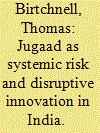| Srl | Item |
| 1 |
ID:
108914


|
|
|
|
|
| Publication |
2011.
|
| Summary/Abstract |
Jugaad is the latest/trend in management and business reports of India's awakening. The term refers to the widespread practice in rural India of jury-rigging and customizing vehicles using only available resources and know-how. While the practice is often accompanied by indigence and corruption in traditional interpretations, the notion of jugaad has excited many commentators on India's emergence into the global economy in its promise of an inimitable Indian work ethic that defies traditional associations of otherworldliness and indolence - widely reported as inherent in India's society and culture. Jugaad has been identified across India's economy in the inventiveness of call-centre workers, the creativity of global transnational elites, and in the innovativeness of Indian product designs. The term has seen an unprecedented growth in popularity and is now proffered as a tool for development and a robust solution to global recession. Jugaad is now part of a wider method for working within resource constraints as 'Indovation'. In this context, the trope is presented as an asset that India can nurture and export. This article argues that far from being an example of 'disruptive innovation', jugaad in practice is in fact part and parcel of India's systemic risk and should not be separated from this framing. Viewed from this optic, jugaad impacts on society in negative and undesirable ways. Jugaad is a product of widespread poverty and underpins path dependencies stemming from dilapidated infrastructure, unsafe transport practices, and resource constraints. These factors make it wholly unsuitable both as a development tool and as a business asset. The article questions the intentions behind jugaad's wider usage and adoption and explores the underlying chauvinism at work in the term's links to India's future hegemonic potential.
|
|
|
|
|
|
|
|
|
|
|
|
|
|
|
|
| 2 |
ID:
143544


|
|
|
|
|
| Summary/Abstract |
When the Indian car manufacturer Tata Motors launched its new ‘people's car’ in 2008 it was widely predicted to revolutionise automobility in India. Yet seven years after the launch, the car has barely made an impact on the Indian car market and is widely regarded as a failure. This article offers a detailed study of the rise and fall of India's ‘people's car’. Based on a mapping of the changing popular representations and symbolic imaginaries that attach to the car as a means to mobility and an object of identity and social status, we suggest that the car failed neither because it was mediocre, nor because it remained economically out of reach for most Indians. Rather, we argue that its insertion into the lower ranks of a powerful status hierarchy of identity-defining objects precluded it from adequately tapping into new and hegemonic forms of consumer aspiration in ‘New India’.
|
|
|
|
|
|
|
|
|
|
|
|
|
|
|
|